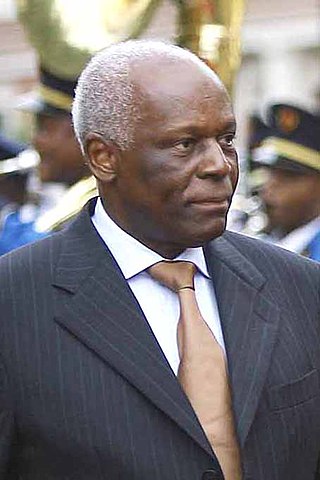| |||||
| Centuries: | |||||
|---|---|---|---|---|---|
| Decades: | |||||
| See also: | List of years in Angola | ||||
Events from the year 2007 in Angola
| |||||
| Centuries: | |||||
|---|---|---|---|---|---|
| Decades: | |||||
| See also: | List of years in Angola | ||||
Events from the year 2007 in Angola

Angola, officially the Republic of Angola, is a country located on the west-central coast of Southern Africa. It is the second-largest Lusophone (Portuguese-speaking) country in both total area and population, and is the seventh-largest country in Africa. It is bordered by Namibia to the south, the Democratic Republic of the Congo to the north, Zambia to the east, and the Atlantic Ocean to the west. Angola has an exclave province, the province of Cabinda, that borders the Republic of the Congo and the Democratic Republic of the Congo. The capital and most populous city is Luanda.

Angola was first settled by San hunter-gatherer societies before the northern domains came under the rule of Bantu states such as Kongo and Ndongo. In the 15th century, Portuguese colonists began trading, and a settlement was established at Luanda during the 16th century. Portugal annexed territories in the region which were ruled as a colony from 1655, and Angola was incorporated as an overseas province of Portugal in 1951. After the Angolan War of Independence, which ended in 1974 with an army mutiny and leftist coup in Lisbon, Angola achieved independence in 1975 through the Alvor Agreement. After independence, Angola entered a long period of civil war that lasted until 2002.

José Eduardo dos Santos was the president of Angola from 1979 to 2017. As president, dos Santos was also the commander-in-chief of the Angolan Armed Forces (FAA) and president of the People's Movement for the Liberation of Angola (MPLA), the party that has ruled Angola since it won independence in 1975. He was the second-longest-serving president in Africa, surpassed only by Teodoro Obiang Nguema Mbasogo of Equatorial Guinea.

TotalEnergies SE is a French multinational integrated energy and petroleum company founded in 1924 and is one of the seven supermajor oil companies. Its businesses cover the entire oil and gas chain, from crude oil and natural gas exploration and production to power generation, transportation, refining, petroleum product marketing, and international crude oil and product trading. TotalEnergies is also a large-scale chemicals manufacturer.

Lobito is a municipality in Angola. It is located in Benguela Province, on the Atlantic Coast north of the Catumbela Estuary. The Lobito municipality had a population of 393,079 in 2014.

Álvaro Holden Roberto was an Angolan politician who founded and led the National Liberation Front of Angola (FNLA) from 1962 to 1999. His memoirs are unfinished.

Dr. Fernando José de França Dias Van-Dúnem is an Angolan political figure who was the First Vice-President of the African Union's Pan-African Parliament. He is a member of the ruling Popular Movement for the Liberation of Angola (MPLA) and served as Prime Minister of Angola twice during the 1990s.

Group Sonangol is a parastatal that formerly oversaw petroleum and natural gas production in Angola. The group consisted of Sonangol E.P. and its many subsidiaries. The subsidiaries generally had Sonangol E.P. as a primary client, along with other corporate, commercial, and individual clients. Angola is estimated to have over 5 billion barrels (790,000,000 m3) of offshore and coastal petroleum reserves, and new discoveries are outpacing consumption by a 5-to-1 ratio.

The Angolan Civil War was a civil war in Angola, beginning in 1975 and continuing, with interludes, until 2002. The war began immediately after Angola became independent from Portugal in November 1975. It was a power struggle between two former anti-colonial guerrilla movements, the communist People's Movement for the Liberation of Angola (MPLA) and the anti-communist National Union for the Total Independence of Angola (UNITA).
The 2000s in Angola saw the end of a 27-year-long civil war (1975–2002) and economic growth as foreign nations began to invest in Angola's untapped petroleum reserves. The government continues to resettle internally displaced persons as its economy recovers and expands.
The Baixa de Cassanje revolt is considered the first confrontation of the War of Independence in Angola and the Portuguese Colonial War throughout the Portuguese overseas provinces. The uprising began on 3 January 1961 in the region of Baixa do Cassanje, district of Malanje, Portuguese Angola. By the following day the Portuguese authorities had successfully suppressed the revolt. 4 January is now Colonial Martyrs Repression Day, a national holiday in Angola.

The institutional corruption in Angola refers to the pervasive and long-standing issue of corruption within the country's government and public institutions. The aftermath of the 30-year civil war and the influence of the Soviet command economy have resulted in significant institutional damage and the emergence of a centralized government with authoritarian tendencies. This has allowed the president and his associates to exert control over the nation's resources, enabling them to exploit the economy for personal gain through legal and extra-legal means.
General Manuel Hélder Vieira Dias Jr, known by the nickname "Kopelipa", is an Angolan general, former public official, and businessman with close ties to former Angolan President José Eduardo dos Santos. In 2014, his net worth was estimated at close to $3 billion.

The vice president of Angola is the second highest political position in Angola; it is appointed by and is the deputy to the president. The position was established by the constitution of 2010.
Gabriela Antunes was an Angolan writer and educator.
Kissuto rombo is a traditional meat dish originating from Angola. The dish is prepared with roasted goat meat rubbed with a combination of garlic and lemon juice.

Catatos is a traditional Angolan dish made with fried caterpillars and garlic. It is often served over rice. The dish is a specialty of the Uíge Province in northwestern Angola.
Events from the year 2004 in Angola